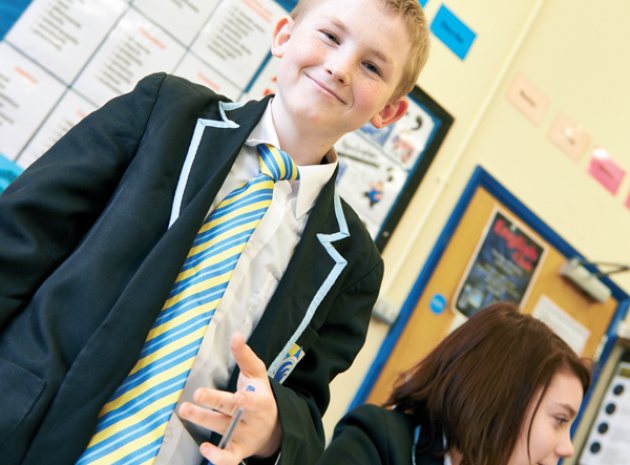The new National Curriculum for Languages at KS3 (and KS2, for that matter) might appear quite daunting at first glance – but in fact, it affords educators a wonderful opportunity to teach with more freedom and creativity than ever before. With the old NC came levels and an obsessive desire to monitor and track pupil progress every two seconds. Some teachers have been so busy testing their learners that there has been little time for anything other than the ‘core’ i.e. vocabulary, grammar and structures, AfL and exam techniques. Now, however, there is a big emphasis on intercultural understanding, and a strong focus on literature, translation and dictation – all of which can inspire exciting and engaging lessons that students will both enjoy and remember.
Cultural connections
The new National Curriculum for Languages for KS3 states clearly in its opening Purpose of Study “Learning a foreign language is a liberation from insularity and provides an opening to other cultures. A high quality languages education should foster pupils’ curiosity and deepen their understanding of the world.” The message is loud and clear: teaching vocabulary and grammar and structures alone is no longer enough. Two of the three strands of the proposed new GCSE for Languages for 2016 also revolve around culture - this is very encouraging and shows some joined up thinking in action. Rather than treating intercultural understanding as an add on, therefore, teachers of languages are going to need to think about how they can incorporate some cultural input into every lesson they teach. A simple example could be when teaching the topic of school. Learners could study the timetable of a pupil in a school on the French island of la Réunion, sourced quite effortlessly online. They could compare and contrast their daily routine looking for similarities and differences. When teaching the topic of leisure, students could investigate typical games that children play in Latin American playgrounds and see how they compare with a UK playground. For the topic of holidays the focus of a pupil-led research project could be to plan a trip to a German speaking country such as Switzerland or Austria with a maximum budget of €2000 for a family of 4. With careful thought and planning, perhaps with an emphasis on cross curricular links, most KS3 topics lend themselves to some cultural input. Where the text book does not offer helpful sources of cultural material, teachers can, with the help of the internet, source a wealth of authentic material to inspire their pupils.
Telling tales
The new National Curriculum for Languages at KS3 also states that pupils should “read literary texts in the language [...], to stimulate ideas, develop creative expression and expand understanding of the language and culture”. This, for me, is one of the most exciting new additions to the secondary languages curriculum and one that I believe teachers can use to motivate their language learners and also effectively incorporate some innovative ICT into their lessons. Storytelling need not necessarily mean just reading or listening to the MFL teacher tell authentic tales. Story telling can and should incorporate target language magazines and pupil and teacher-produced stories (generated using Web 2.0 tools and apps). The following links are well worth exploiting: storybird.com A free website which allows teachers and pupils to create this own stories in any language. toondoo.com A fun and free website for producing simple cartoons in the target language. goanimate.com Cartoon animation website including text and sound fodey.com Free newspaper generator to encourage reading and wrting in the target language
Words and music
Statistics show that 92 per cent of 14- to 17-year-olds own an MP3 player and they listen to an average of nearly 2.5 hours of music per day. We really need to exploit this more in our languages classrooms (for a collection of useful links, visit www.symbaloo.com/mix/mflandmusic). Poetry is another wonderful way of encouraging genuine creativity among language learners and is also a great means of revisiting dictionary skills. It encourages independence and allows learners the (rare) opportunity to say what they want to say. A simple Google Images search, eg, poesía para los niños, will bring up hundreds of ready-made resources. Why not consider running a competition to find the best MFL poet in the school/year group?
Reaching out
Children love to receive letters and parcels and this is perhaps quite a rare thing in the 21st century. In terms of curriculum planning, letter writing affords language learners the exciting opportunity of developing their reading and writing skills for a real purpose and audience (as well as stepping away from the computer), which is hugely motivational. Take a look at the eTwinning UK website via the British Council - a safe portal where MFL teachers can find partners to connect with from across Europe and beyond. Skype in the classroom could also be a helpful starting point. As a teacher of MFL, I was fortunate enough to be involved in a Year 7 transition French project working alongside the York Theatre Royal PET project team (http://tinyurl.com/SB3PetitsCochons). This helped me to realise that drama is a creative and co-operative form of learning which really motivates learners. It does, however, require enthusiasm and a willingness to take risks on the part of the students and the teacher. What is great is that there is no longer any need to spend departmental budgets on resources as there are now so many free ideas and resources (such as linksintolanguages.ac.uk/resources/2561) for MFL teachers keen to bring drama into their language classrooms out there on the internet.
Lost in translation
Translation is something that I am sure most MFL teachers do already - I’m just not convinced we give it a name. Many of the skills we practise with our language learners fall under this heading: Skimming and scanning and looking for gist A résumé in English of a reading text Find the Spanish for… Comment dit-on en français….? / Wie sagt mann ... auf Deutsch? Dictation for those teachers who are fairly new to the profession may, however, be more of an alien concept and require more thought and careful consideration. One way of combining ‘great literature’ and dictation is to have learners work in pairs sitting back to back, with one reading from an original text, e.g. Un lion à Paris, and a partner listening intently and writing down, with a distinct focus on accuracy, all that he or she hears. Pupils then swap roles and finally compare their transcription with the original version using AfL techniques such as WWW / EBI (what went well / even better if). This is a fun and effective activity for practising all four key skills - and the fact that the book is an authentic native speaker text further enhances pupils’ intercultural understanding as they simultaneously learn about the key landmarks in the French capital. This type of dictation task requires preparation in the form of grapheme-phoneme correspondence instruction. Pupils’ phonic awareness is vital to the success of dictation activities as pupils are required to use their knowledge of letters and sounds to grapple with new and unknown language. This again is very much in line with the requirements outlined in the new National Curriculum for Languages at KS3 and suggestions made in the most recent MFL Ofsted report from 2011. According to Professor Mike Kelly discussing language provision in the UK in a newspaper article of September 2013: “Young people are bored with describing their pets and what they do at the weekend […] You’ve got to bear in mind that for 13-year-old kids, when they’re making their subject choices, their decision depends heavily on what they enjoy studying.” Including more intercultural understanding, literature, and fun ways of incorporating translation and dictation in MFL secondary classrooms will certainly provide new and creative ways of making language lessons more stimulating and relevant. The ideas outlined in this article, which link directly to the expectations of the new National Curriculum for Languages, appear to offer us some real hope for the future.
Useful links:
Intercultural Understanding tinyurl.com/IUnewNC1 tinyurl.com/IUnewNC2 http://tinyurl.com/IUnewNC3 http://tinyurl.com/newNCflame Poetry in MFL tinyurl.com/PoesiaNinos tinyurl.com/PoetryCompetitonMFL British Council and eTwinning etwinning.net britishcouncil.org/etwinning
about the author Suzi Bewell has been the curriculum area leader for MFL at the University of York since September 2010. Prior to this, she taught languages at a specialist language college in York. She was one of 12 national lead practitioners for the Specialist Schools and Academies Trust and was also a regional trainer for Links into Languages.










